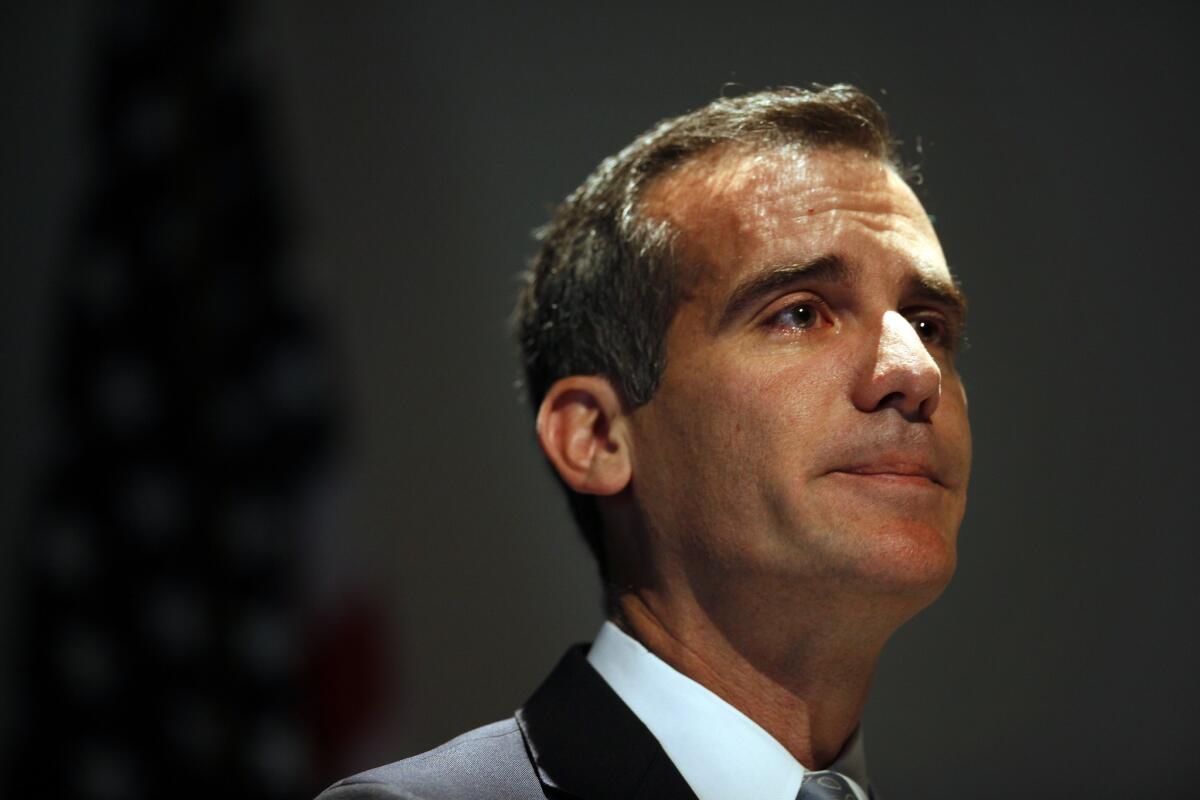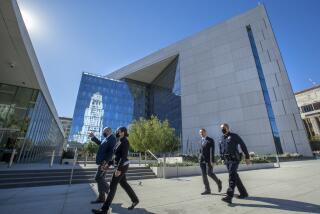L.A. Mayor Garcetti sets up a nonprofit to aid city initiatives

- Share via
Faced with limited financial resources at City Hall, Mayor Eric Garcetti has created a nonprofit organization to raise money for some of his initiatives, including efforts to boost cultural tourism, find summer jobs for low-income teens and revitalize the Los Angeles River.
The Mayor’s Fund for Los Angeles, incorporated this month, has collected more than $2.3 million so far and will work on efforts to make the city more livable, its economy stronger and its government more efficient. But it could also provide a new venue for businesses, labor unions and special interests to curry favor with Garcetti.
Garcetti said there are no specific restrictions on donors but promised to have “filters” to address potential conflicts of interest.
“I think we’re going to be very careful about making sure we do everything we can to ... avoid any conflicts,” said the mayor, appearing earlier this week at the kickoff for Summer Night Lights, a city-run program of arts and athletic activities for families, which also received support from the fund.
Although contributions to the mayor’s election campaign are capped at $1,300 per donor per election cycle, donations to a mayoral nonprofit are not limited. But any contribution of $5,000 or more raised by Garcetti for the nonprofit must be reported to the city’s Ethics Commission, said Robert Stern, former president of the watchdog group Center for Governmental Studies.
Stern said donors to such groups frequently expect something in return — at minimum, an audience with the politician receiving the assistance.
“The question always is, why are they giving? Some are giving for purely altruistic reasons because they want to do good things for the city. But many are giving because they want to help themselves and be looked upon kindly by the mayor, or whoever’s doing” the fundraising, he said.
Garcetti’s mayoral predecessor, Antonio Villaraigosa, regularly collected contributions of $50,000 or more for separate nonprofit groups charged with carrying out his initiatives, such as running public schools or planting 1 million trees. But those activities also prompted complaints from neighborhood activists who asserted that donors were seeking special treatment.
Still, Villaraigosa did not rely on just one nonprofit to pursue his policy goals. Garcetti, by contrast, is modeling his effort, at least in part, after the Mayor’s Fund to Advance New York City, which has directed hundreds of millions of dollars to a wide range of initiatives, including tree planting, emergency preparedness, youth nutrition programs and the installation of free WiFi on 95 blocks of Harlem.
New York’s nonprofit showed that philanthropic organizations frequently move more swiftly than government agencies, particularly in times of crisis, said USC sociology professor Manuel Pastor, who serves on the board of directors for the Los Angeles mayoral fund.
“They were able to respond to … Hurricane Sandy with aid much more quickly through the mayor’s fund than through some of the public processes that take more time,” he said.
The Walt Disney Co., the Annenberg Foundation and the California Endowment have already provided major donations for Garcetti’s effort to provide jobs, educational programs and cultural activities for young people during the summer. Garcetti Deputy Chief of Staff Rick Jacobs, who serves on the nonprofit’s board, said the group will also seek “intellectual” resources.
Garcetti assigned Jacobs to raise money for the fund.
Plans for the mayoral nonprofit drew sharp words from political consultant Michael Trujillo, who assisted the unsuccessful campaign of Wendy Greuel in last year’s mayoral election. Trujillo said in an email that Garcetti is instituting his “own version of pay-to-play.”
“It’s nice that the mayor is now being transparent about his political slush fund,” Trujillo said.
Garcetti aides disagreed with Trujillo’s characterization and said the fund would operate “transparently” as it works to help the city. Pastor, the USC professor, said the nonprofit has a board of directors “strong enough” to ensure that the fund is run properly.
Follow @DavidZahniser and @finneganLAT for more news out of Los Angeles City Hall.
More to Read
Sign up for Essential California
The most important California stories and recommendations in your inbox every morning.
You may occasionally receive promotional content from the Los Angeles Times.












